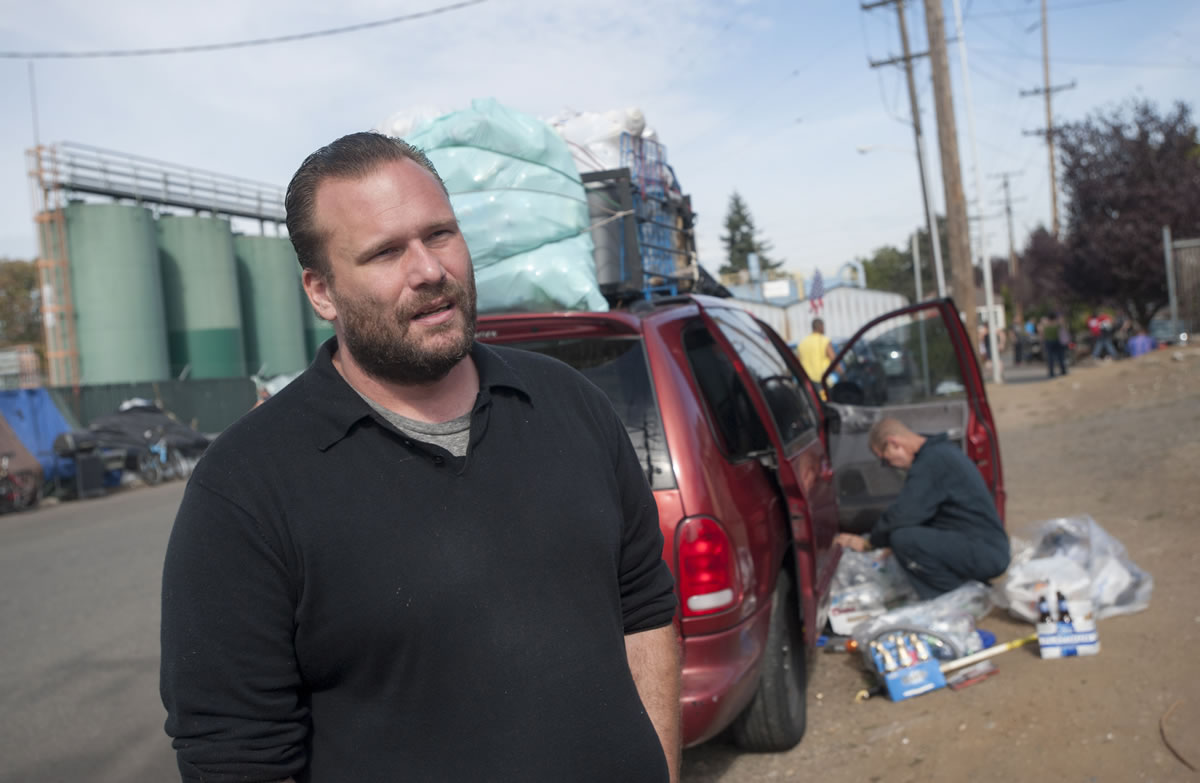On the sunny Tuesday morning of Oct. 6, two Columbian reporters and a photographer visited the growing tent city in the blocks surrounding the Share House shelter in west Vancouver.
The sidewalks in the vicinity of West 12th and King streets were lined with dozens of tents, bicycles, tarps, blankets and shopping carts. Days earlier, the city council had voted to lift a ban on overnight camping in public places. Although the law wouldn’t take effect until Oct. 21, word had clearly gotten around that in Vancouver, one could camp in peace.
We talked to several people who seem to represent a cross-section of the homeless community, including the chronically homeless, those who suffered a life-altering blow and those temporarily down on their luck.
Here’s a brief glimpse into their lives.
James ‘Michael’ Roach
In his past life, he was a superintendent for a construction company in California. A carpenter by trade, he earned $70,000 a year and lived in a house where the redwoods meet the ocean.
Today, James “Michael” Roach, 55, sleeps in a tent on West 12th Street near the Share House homeless shelter. He’s been homeless three years.
His life was upended in 2004, when a car ran over him. His injuries were severe: his left leg was crushed, and titanium screws held together his right leg. He lost 18 teeth. He was bedridden almost a year.
“Messed me up pretty good,” the thin man with shaggy brown hair said, pulling up his pant leg to reveal twisted flesh.
Ten years ago, he moved to the Northwest with his son, whom Roach had raised alone since age 2.
But his luck didn’t improve. After breaking his wrist falling down on a job due to a lack of feeling in his damaged foot, he was unable to work. He went on welfare.
Roach’s driver’s license was taken away because he’d had seizures after the accident. He racked up $8,000 in fines when he was caught driving his boy to school, he said. Then Roach was diagnosed with kidney cancer, adding to his pile of medical bills.
When he’d depleted his savings, Roach began receiving $1,200 a month in Social Security, which he spent paying off his traffic fines rather than housing so he could regain his driver’s license.
Roach said he never expected to be on the streets. Living outside, bathing in the Columbia River and trying to find a place to use the bathroom have been rough.
“I worked all my life. I guess I was kind of judgmental about the homeless. … It’s brung me down to earth more than anything,” Roach said. “I’m not as judgmental.”
He also never thought his son, 23, would be living in a car parked down the block from his tent.
“If my kid could get a job, we would just move back in together,” Roach said. “I feel for him more than anything.”
Kat Fairfax
Kat Fairfax, 23, unlocked the door of her blue mobile hut from the inside and cautiously peered out, clutching her small dog, Harley.
She has Asperger Syndrome, an autism-spectrum disorder, which makes her “a little bit off” socially, said Fairfax, a slight woman with pink glasses and a shaved head. She also said she has severe post-traumatic stress disorder from the abuse she suffered in foster care as a teen in Seattle before running away at age 15.
But in addition to those problems and the difficulty of meeting her basic needs living on the street, Fairfax has another worry: She was diagnosed with a stage 3 brain tumor after an onset of bad headaches, she said. Insurance covers her medical treatment, but she’s fighting for Social Security.
She ended up in Vancouver four years ago after attending a Rainbow Gathering in Cougar.
“(Vancouver) is the first place I’ve ever remotely in my life fit in,” she said.
She recently found her biological father living in a group home near Share House after his release from prison, she said. A DNA test proved their relationship.
Due to her PTSD, she can’t work because she’s inclined to fight. She earns money by panhandling and selling things people give her. For the last month, she’s been living on West 12th Street, where she has been preyed upon and victimized, she said. Men are her biggest challenge.
Her ordeal prompted local homeless advocate Dorothy Rodriguez to find a small fiberglass hut for Fairfax to sleep in through the group Huts for Hope.
“I can lock my door now so they can’t come in,” said Fairfax, who needs plenty of rest due to her illness.
For three years, she’s been on a waiting list for permanent housing through Share House, said Fairfax. She expects to get placed in an apartment soon.
She hopes it’s before winter.
Lloyd Dodge
Lloyd Dodge has been homeless for 35 years, and he doesn’t expect that to change.
“I’m permanently homeless by choice,” he said.
Dodge, 51, said he ran away from home in Medford, Ore., at age 16, no longer willing to submit to his mother’s beatings. He hitchhiked to Portland and wound up in Vancouver when he was 19.
Today, he suffers from post-traumatic stress disorder from his childhood trauma.
“I still have dreams of her breaking through whatever house I live in or vehicle,” said Dodge, who lives near Share House in a small wood and fiberglass hut on wheels. “I’ve tried living in places and I can’t get comfortable. … How far do I have to run before my mom stops haunting me?”
He’s had jobs, but due to his PTSD, he can’t handle anyone yelling at him because it triggers a fight-or-flight response, he said.
“I’ll hit them first and then ask questions later,” he said.
Like many others on the streets, Dodge has struggled with drug addiction. He’s used meth, LSD, “everything,” but eventually got tired of it, he said. Nowadays, he sticks to marijuana.
He wants to help people. One day, he’d like to be a property manager for a homeless shelter for, say, military veterans.
Dodge, who was married once, has five children by different mothers. He isn’t in touch with any of them and doesn’t know where they live. He found his oldest daughter on Facebook, but she ignored his friend request.
He’d get a permanent place to live, he said, if his kids came back.
“That would be a big turning point,” he said. “They mean more to me than anything.”
Stephen David Blair Richardson
A man with a white beard poked his head out of a small tent on West 12th Street and said hello.
He reclined on a twin air mattress, wearing a tank top, camouflage pants and boots.
His name, he said, is Stephen David Blair Richardson, and he’s 66. He blurts out his story, speaking so quickly it’s tough to make out all of the words.
Born in Vancouver, Richardson said he served in the Army from 1967 to 1971. During that time, he said, he was stationed at a nuclear missile site in Kingston, as well as being deployed to Vietnam. He “got fried” by the microwaves in the missiles, said Richardson, adding that his military records were flagged for 40 years. After his military service, he said, he went into the CIA in the non-official cover program.
Twelve years ago, he moved to Vancouver from Camas to take care of his elderly parents. His car was stolen, and all his papers were in it.
Sitting in his tent, he returned to talking about his days in the CIA, detailing the wrongs against him committed decades ago. He talked, his words spiraling into the past, as he rubbed the red scrapes on his head among tufts of white hair.
Dean DeRose
Dean DeRose, 39, had been living in a tent on West 13th Street for a week.
He recently lost his temporary job at Northwest Packing, where he’d worked 70 hours a week. Alarmed at the loss of income, his roommate kicked him out of their place in Hazel Dell. He doesn’t have other friends to stay with. Many of his family members are dead, including his parents.
DeRose walked in the middle of the night to west Vancouver, knowing he’d find people he knew from his days working as house manager for Share House. Fellow campers quickly outfitted him with a tent to sleep in.
He was homeless before, in San Diego, struggling with drug addiction. He’s been clean five years, “which, in this environment, isn’t easy to do because you’ve got people doing every drug known to man around you,” he said.
DeRose moved to Vancouver when a friend invited him to stay with her. That arrangement didn’t work out, and so he stayed at Share House, first as a resident, then as a resident-staff member. After that, he worked at a family shelter in Hazel Dell. When he was let go about a year ago, he found a place to live.
And now here he is, back on the street, relying on food stamps to get by.
“Aggression and violence are probably the two biggest problems — getting your stuff stolen right under your nose,” he said. “I’m constantly having to watch my back.”
He’s waiting for a job with the federal Transportation Security Administration to come through. He interviewed, took a test and passed the background check.
“It would be an awesome job because it would be a government job,” said DeRose, who has an associate degree and aspires to become a nurse.
Until the TSA job happens, he’s hoping to find work through a temp agency so he can save enough money to move into an apartment.
“Hopefully, this will be temporary,” he said.




